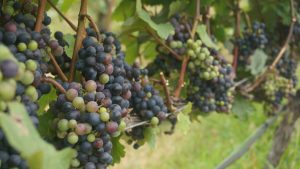
Climate Experience:
Winemakers have noticed grapes are maturing early and being harvested earlier than they used to.
Explanation:
- The region has experienced 20 of the past 21 years above average temperatures.[1]
- Increase in temperatures affect time of harvest and in turn quality of grapes.[2][3]
- Grape ripening is occurring .5 to 3 days earlier per year in Australia.[4]
- Pinot noir grapes display the greatest sensitivity to climate change.[5]
Ramifications:
- Some regions can expect harvest to come 45 days earlier than normal by 2050.[6]
- Some regions may also be adversely affected by grapes not meeting their chilling requirements.[7]
- Up to 70% of Australia’s wine growing regions will be less suitable for grape growing by 2050.[8]
- Central/Northern Victoria is expected to see a 16-52% decrease in wine grape quality by 2030.[9]
- The wine industry contributed $7.6billion directly to the Victorian economy in 2015,[10]this is expected to be disrupted.
- The wine industry contributed 13,000 jobs to the Victorian economy in 2015,[11]this figure is expected to decrease.
- Changes will have to be made to agricultural practices and supply will be reduced, both of these factors will push wine prices up.[12]
What can be done?
- Email your local MP and tell them that action on climate is important to you and explain the impacts being felt in your area. One email might not feel like much but most politicians consider it to be representative of 100 citizens.
- Help support the Act on Climate collective by donating; we are leading the charge for climate action. Your donation helps in advancing policies that prevent climate change from getting worse, we aim to empower communities and build a strong pro-climate-action constituency that governments can’t ignore, and as an added bonus it’s tax-deductable.
- Get involved with Act on Climate. We meet every Monday at 6pm (upstairs at 312 Smith St, Collingwood) and welcome all newcomers to join in the fight for climate justice. If you are unable to attend, follow us on Facebook, Twitter and Instagram to keep up with the latest campaign.
* We aim to keep our material as accurate and as relevant as possible. Working with climate science, a field that is being constantly updated, keeps us on our toes. Information on this site was gathered on June 1 2019; if you notice information that needs updating please let us know. For the full reference list please see the following.
________________________________
[1]“Australian Climate Change Site Data – Mildura”, Bureau of Meteorology, access April 23 2019, http://www.bom.gov.au/cgi-bin/climate/hqsites/site_data.cgi?variable=maxT&area=aus&station=076031&dtype=anom&period=annual&ave_yr=0
[2] Ramon Mira De Orduna, “Climate Change Associated Effects on Grape and Wine Quality and Production,” Food Research International43, no. 7 (2010).1044.
[3]DI Jackson and PB Lombard, “Environmental and Management Practices Affecting Grape Composition and Wine Quality-a Review,” American Journal of Enology and Viticulture44, no. 4 (1993).424.
[4]Paul R Petrie and Victor O Sadras, “Advancement of Grapevine Maturity in Australia between 1993 and 2006: Putative Causes, Magnitude of Trends and Viticultural Consequences,” Australian Journal of Grape and Wine Research14, no. 1 (2008).44.
[5]LB Webb, PH Whetton, and EWR Barlow, “Potential Impacts of Projected Greenhouse Gas-Induced Climate Change on Australian Viticulture,” Wine Industry Journal21, no. 4 (2006).19.
[6]”Modelled Impact of Future Climate Change on the Phenology of Winegrapes in Australia,” Australian Journal of Grape and Wine Research13, no. 3 (2007).165.
[8]Melbourne, “Appetite for Change: Global Warming Impacts on Food and Farming Regions in Australia.”, 22, https://sustainable.unimelb.edu.au/__data/assets/pdf_file/0009/2752272/MSSI_AppetiteForChange_Report_2015.pdf
[9]Webb, Whetton, and Barlow, “Potential Impacts of Projected Greenhouse Gas-Induced Climate Change on Australian Viticulture.”, 19.
[10]Wine Victoria, “Policy Priorities Election 2018-19,” (2018).5, http://www.winevictoria.org.au/images/Wine%20Victoria%20Policy%20Brochure.pdf
[12]“Climate change will threaten wine production, study shows,” The Guardian, accessed April 29, 2019, https://www.theguardian.com/environment/2013/apr/08/climate-change-wine-production
